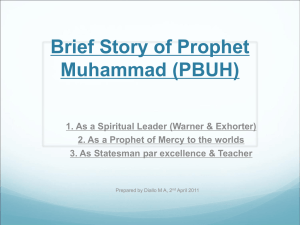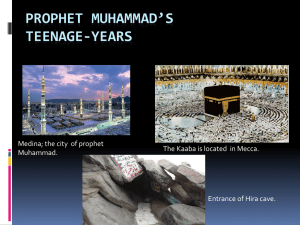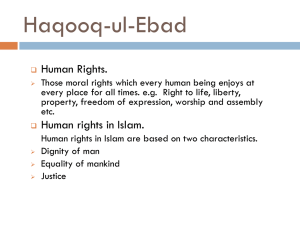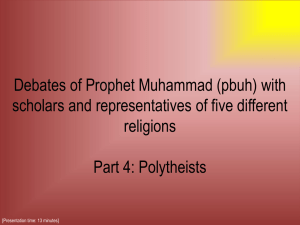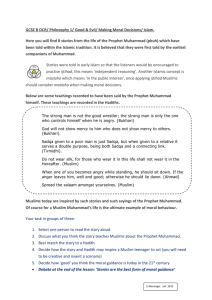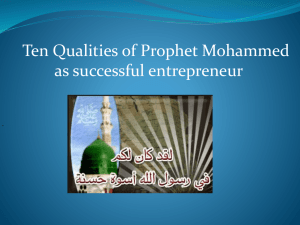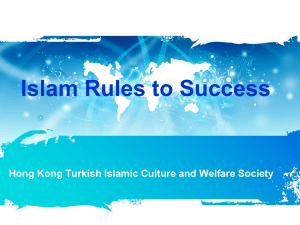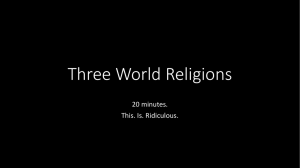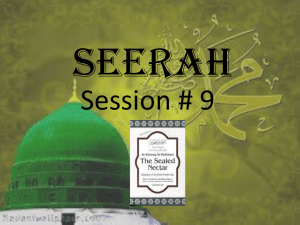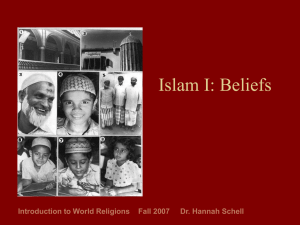Brief History of Prophet Muhammad
advertisement
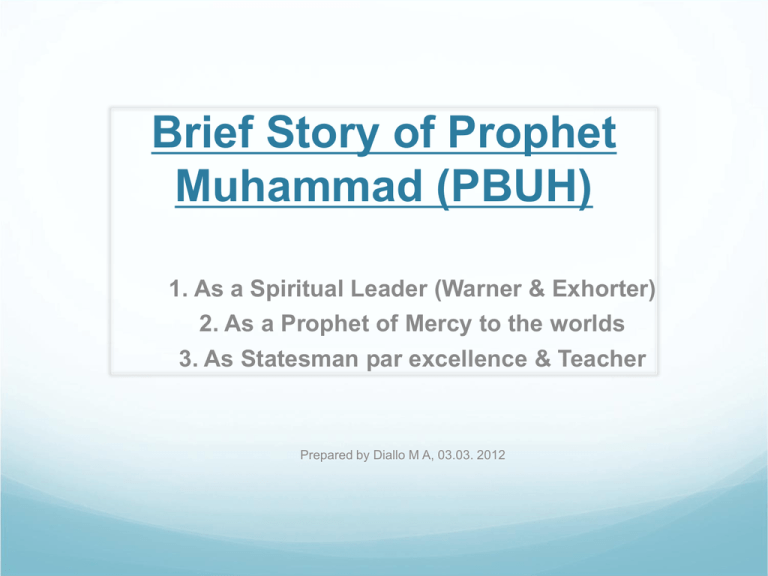
Brief Story of Prophet Muhammad (PBUH) 1. As a Spiritual Leader (Warner & Exhorter) 2. As a Prophet of Mercy to the worlds 3. As Statesman par excellence & Teacher Prepared by Diallo M A, 03.03. 2012 1. As a Spiritual Leader (Warner & Exhorter) Prophet Muhammad (PBUH) remains the human being whose life is the most documented than any other. His case is unique and outstanding as: a spiritual leader, a father, a husband, a businessman, a political leader, etc. Even with the combination of all the above, one role never influenced negatively the other. Almighty God said of him “…the best example to follow…”. Even though it is difficult to define the right concept of God, the Prophet Muhammad (PBUH) successfully taught his people and his followers about Almighty God without painting any picture of Him or any kind of representation whatsoever (Qur’an chapter 112). 1. As a Spiritual Leader (Warner & Exhorter) (Cont.) Prophet sent as bearer of glad tidings and a Warner. He emphasized on accountability, both in this world as well as in the hereafter: “Verily, We have sent you [O Prophet] with the truth (i. e. Islam), as a bearer of glad tidings (to the believers) and a Warner (to the unbelievers); and you shall not be held accountable for those who are destined for the blazing fire” (Qur’an 2:119). In an almost similar message Allah says: “And We have not sent you (O Muhammad!) except as a giver of glad tidings and a Warner to all mankind, but most of men know not” (34:28). Every one is a shepherd and will be accountable as such. The Prophet Muhammad (PBUH) said: “Every one of you is a shepherd and will be accountable for his flock. The ruler is a shepherd and will be accountable for his community; a man is a shepherd of his family and will be accountable for them; a woman is a shepherd of her husband’s household and will be accountable for her charge; a slave is a shepherd looking after his master’s property and will be accountable for it. Indeed, every one of you is a shepherd and will be accountable for what is under their care.” (Bukhari) . 1. As a Spiritual Leader (Warner & Exhorter) (Cont.) A person in a position of responsibility must not order his subordinates to do what is forbidden in Islam or harmful. The Prophet Muhammad (PBUH) did not just preach but went on to show mankind how to achieve success. He made Muslims aware of the consequences of disobeying Allah (SWT) both in this world as well as in the hereafter. He established a religious and social framework for the life many races. He introduce a whole new way of life that is followed not only in his own age but till today. He preached Islam as the restoration and perfection of the Abrahamic faith. Prophet Muhammad charm manner won him the affection and devotion of most people who learn about his character. 2. As a Prophet of Mercy to the worlds Prophet Muhammad (PBUH) is a mercy to all the worlds in the way he dealt with people and specially for the reforms and legislations he left for mankind. The leadership of the Prophet Muhammad (PBUH) also included the highest standards of morality and spirituality. Allah (SWT) states in the Qur’an: “And We have sent you (O Muhammad!) not but as a mercy to all the worlds (mankind, jins and all that exists)” (Qur’an 21: 107). The Prophet conducted himself perfectly in situations of weakness as well as in strength (examples of the way he dealt with people in Mecca and Madinah). The Prophet took the greatest care of the religious as well as the economic needs of his followers. He made treaties and alliances with tribes, established diplomatic relations all built on morality and honesty. The first ever written constitution in the history of mankind was made under his leadership in Madinah. 2. As a Prophet of Mercy to the worlds (Cont.) His attitude towards the poor, needy and orphans or weak is sufficient proof for this. He was tolerant and gentle in his approach. He made matters related to faith simple and easy for everyone: no fasting if you are sick or elderly or on a journey, pray as you can, no pilgrimage if you are unable. He legislated for fair and equal treatment of all human beings. In his last public sermon he said that no human is superior to another except by piety. He forbad the killing of non-combatants (women, children, elderly, animals, tree, etc.) during battles. 2. As a Prophet of Mercy to the worlds (Cont.) He never turned down somebody whenever he is asked for something, even if he needs it himself. He treated every one including his companions with dignity and respect. His mercy did not leave out even the environment, he forbad people to misuse resources (water in particular or cutting trees unless for a good cause). He showed mankind how to achieve success in every aspect of life. He is certainly the best example for all human beings. 3. Prophet Muhammad (PBUH) as a Statesman & a Teacher The leadership of Prophet Muhammad (PBUH) was most comprehensive and dynamic. He was the model of virtue and spirituality. He was a noble and compassionate teacher, a guide, and a reformer. As a teacher he ordered to convey his message even if it’s one verse and entrusted that to his followers. As a Statesman, the prophet Muhammad (PBUH) unified the Arabian Peninsula, established a great State whose capital was Madinah, he defeated his enemies. He was a skillful and a courageous political leader. He never initiated a war but decisively defended his faith and his people whenever he had to do so. 3. Prophet Muhammad (PBUH) as a Statesman & a Teacher (Cont.) He always emphasized peace and harmonious relations instead of fight. He offered a vision to the people of Madinah: unified Jews, Christians and Muslims. They all lived in the same land and were treated equally regardless of their faith. He broke the tribal system after the conquest of Mecca and set the stage for a new era of a unified community. He built sacred bounds of brotherhood within the community that is still continuing till today. He lived the life of a poor man although he was able to live like a king. He build an empire without palaces and guards. 3. Prophet Muhammad (PBUH) as a Statesman & a Teacher (Cont.) He managed to put in place sound institutions supported by sound policies and used great wisdom in choosing the men to whom delegate tasks. He commanded the troops in the battlefields and won resounding victories (i. e. Badr). His great political vision led his followers to establish an empire larger than the Roman. He formed military alliances and avoided conflicts. Leadership principles followed by the Prophet Muhammad (PBUH) An in depth study of the leadership of the Prophet Muhammad (PBUH) shows that he followed principles listed as follow: 1st Principle: To begin from the possible Aisha, She said: “Whenever the Prophet had to choose between two options, he always opted for the easier choice” (Al-Bukhari). 2nd Principle: To see advantage in disadvantage The prophet Muhammad (PBUH) guided by the Qur’an (94: 5-6), saw opportunities in every problem. Leadership principles followed by the Prophet Muhammad (PBUH) (Cont.) 3rd Principle: To change the place of action He migrated to find more suitable place to fulfill his mission, that was to deliver the message of Islam. 4th Principle: To make a friend out of an enemy (Qur’an 41:34) The life of the Prophet is an historical testimony of this. He returned bad deeds by doing good and that had a conquering effect over his enemies. 5th Principle: To turn minus into plus A British orientalist remarked “He faced adversity with the determination to writing success out of failure”. 6th Principle: The power of peace is stronger than the power of violence He ordered his direst opponents to go free after the conquest of Mecca. That resulted in them to willingly and immediately accept Islam. Leadership principles followed by the Prophet Muhammad (PBUH) (Cont.) 7th Principle: Not to be a dichotomous thinker He always looked for a third option instead of focusing on 2 only. 8th Principle: To bring the battle in one’s own favorable field He refused to engage in battles if he can sign treaties that can allow the confrontation of ideas instead of fighting. He knew Islam will prevail in those cases. 9th Principle: Gradualism instead of radicalism He implemented social changes gradually rather than radically attacking all aspects at once. 10th Principle: To be pragmatic in controversial matters He was willing to compromise in order to reach agreement as long as that does not affect the Islamic faith. Brief Story of Prophet Muhammad (PBUH) That was a brief touch about the life of the most noble human being who ever lived. Please investigate further about the legacy of Prophet Muhammad (PBUH) in all fields of life, you will come to know that he was indeed the must beautiful pattern to follow for our own success and salvation. For further clarification and follow up, please contact: Dawah Committee Kowloon Masjid: km.dawahcomm@yahoo.com.hk or M. Ali: poukou@gmail.com

